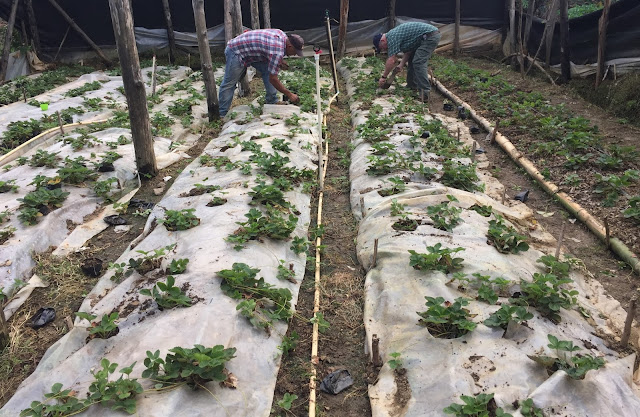Increasing Strawberry Production in the Dominican Republic
The Sabaneta Women’s Group is an association founded in 2013 by the community of Sabaneta, in San José de las Matas, Dominican Republic. It is currently composed of 10 members, who usually meet once a month to discuss key points, work on sustainable communal projects and reforestation, and organize interesting lectures. They also have a small savings group that includes children, youth and men. Since the beginning, they have grown and developed several coffee products and in 2019 decided to start a project focused on strawberry and vegetable production to diversify plantation areas. They allocated approximately 1,000 square meters of land in a greenhouse to strawberry production.
Strawberry cultivation is very dynamic that has many variables. Quality fruits can be grown in a period of eight months, between 800 and 1,300 meters above sea level, with optimal conditions taking place between October and May. In mid-2019, the Sabaneta Women’s Group requested a Farmer-to-Farmer volunteer to train them in strawberry production and help them establish and implement a system of good agricultural practices. Additionally, they wanted to strengthen their knowledge on strawberry collection, post-harvest and pest control. Moreover, the women’s group was not adequately tracking their sales and costs and therefore requested another volunteer to train them on record-keeping, budgeting and economic risk assessment.
For the first assignment, the chosen volunteer was Mr. Ross Penhallegon, a retired extension horticulture agent from Oregon State University, where he worked for 33 years. He has visited 41 different countries and has completed over 100 Farmer-to-Farmer assignments, primarily teaching proper pruning techniques. His wife was selected for the second assignment. Ms. Kate Penhallegon has taught classes on how to grow various herbs and vegetables and has created value-added products out of this homegrown produce. Both volunteers traveled to the Dominican Republic from October 20th-November 3rd, 2019.
During the two weeks of their assignment, Ross worked in the greenhouse, replanting strawberries, and teaching members of the women’s group about best practices related to fertilization, irrigation, and insect and disease control (specifically aphids, mites, strawberry root weevil, coffee insects and powdery mildew, gray mold and sooty mold). He also taught them to reduce soil degradation and water pollution by adopting sustainable agriculture and to properly prune their strawberry groves and coffee shrubs. He expected all these skills to significantly increase their yields.
On the meantime, Kate trained the women to use budgets to improve their efficiency and gain better control of their lives and businesses. She taught them to keep records of sales in proper categories and recommended that they reduce the number of products to only the ones that sell well and align prices to their true costs to guarantee profits. Additionally, she trained the female farmers and entrepreneurs on canning and food preservation. They had never canned before but recognized the benefits of it, like preserving food for possible future bad times and facilitating the transport of their products.
Kate also realized that the women had already made other value-added products like coffee mixes, coffee soaps and even bracelets. Therefore, she also taught them to make lip balms and hand creams from ingredients found in the kitchen, and even showed them the process to make candles.
Thanks to Ross’ and Kate’s support, the Sabaneta Women’s Group now record their sales and use appropriate budgets, and create and sell new products, like strawberry jam and lip balms. More impressively, they had an increase of 85% in their strawberry production! All of this resulted in an increase in their profits, which in turn lead them to increase the size of their strawberry farm.
By teaching these female farmers about effective farm management and administration, better production practices and value-added products; Ross and Kate empowered this female agriculture group and ultimately increased the food security and living standards of the entire Sabaneta community.





.png)

Comments
Post a Comment